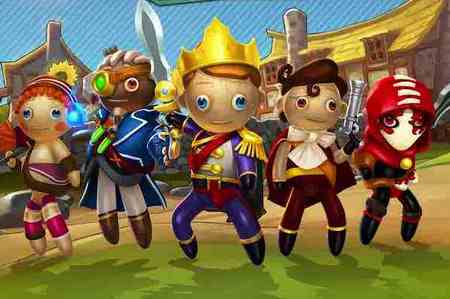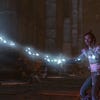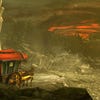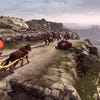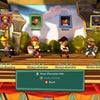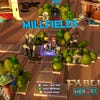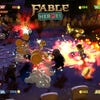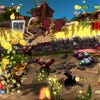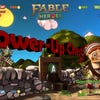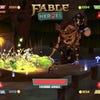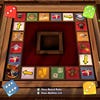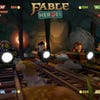Peter Molyneux leaves Fable in "safe hands", say its creators
"He's one of the most misquoted guys I've ever come across."
Fans need not worry about the Fable series following Peter Molyneux's shock exit from Microsoft - so say the creators of the franchise.
Molyneux co-founded Lionhead in 1997 after leaving EA-owned Bullfrog. While there, he created Black & White, Fable, Black & White 2 and The Movies before Microsoft swooped in to buy the studio in 2006.
Fable was developed by Big Blue Box, a satellite studio of Lionhead, by founders Dene and Simon Carter. The brothers left Lionhead recently to start a new game company called Another Place Productions, a venture announced on 1st March.
"Peter was super passionate about Fable: The Journey, so when we heard he was leaving Lionhead it came as a complete surprise," Simon Carter told Eurogamer.
"However he's leaving behind an awesome team who are capable of amazing things, so we know his baby is in safe hands.
"It's fair to say that I owe my career to Peter. He gave me my first job at Bullfrog working on Magic Carpet, and since then I've had the fortune to work with him on Dungeon Keeper and various Fables.
"Working with Peter is always a fascinating experience as he's amazingly driven, incredibly passionate and awesomely unpredictable. I can't wait to see what he does next - whatever it is, the journey alone will be worth the watch."
"He's leaving behind an awesome team who are capable of amazing things, so we know his baby is in safe hands."
Developer James Duncan joined Lionhead in 2006 as an artist and helped make Fable 2 and Fable 3. He left in March 2010, a few months before Fable 3 launched, to start RedBreast Studios and set to work on a mystery iOS space combat and trading game.
"It's a big loss for the company," he told Eurogamer. "As a figurehead and as a source of creativity, it was great to have someone like him on your side.
"However, Lionhead still has a lot of very talented and inspiring people. I think gamers will be really interested to see what they can come up with post Peter."
There are two games currently in the works at Lionhead - that have been announced.
One is Kinect exclusive Fable: The Journey, the other is a four-player Xbox Live Arcade beat 'em-up called Fable Heroes. But Lionhead is rumoured to be working on an MMO and, of course, Fable 4, which has been touted as a next Xbox launch title.
Molyneux will continue to work on Fable: The Journey - a game he demoed to press only two weeks ago - in a consultancy basis. But his main focus is his new company - the Guildford-based start-up 22 Cans.
So, what is Molyneux, often criticised by gamers for failing to deliver on his promises, like to work with?
"Peter is a very inspiring chap to work with," Simon Carter told Eurogamer. "A lot of the time when he is talking to other people and he might go off on a slight tangent, he is doing so out of genuine passion and belief in what he is talking about. He's not doing it for any other motivations. That helps a lot. He's just as passionate and motivated when he is working on a project as well."
One of Molyneux's most famous promises was made in the run up to the launch of Fable 1 on Xbox.
He told press that if gamers were to knock an acorn off a tree in the game, it would grow over time into an oak tree - suggesting some kind of self-propagating vegetation.
This, to many fans' disappointment, failed to materialise.
He's one of the most misquoted guys I've ever come across.
"He's one of the most misquoted guys I've ever come across," Dene Carter said. "Maybe everybody is to some degree. But the acorn thing, as an example, was a throwaway example. We were talking about the fact we wanted the world to be reactive. And Peter picked the acorn thing as a random example, like, imagine a world of this level of detail.
"He wasn't saying, oh, by the way, we're actually going to have a shrubbery growth simulator in there. I mean seriously, it's not like Alan Titchmarsh was the person advertising Fable. It wasn't Alan Titchmarsh's Fable - have some trees.
"That was taken out of context completely and blown out of all proportion. Rather than being something that was meant to be an inspiring comment, it turned into part of a feature list.
"Incidentally, at no point did Peter come back and say, 'well, it's out of the can now, we're going to have to do it!' Because he realised it had no gameplay value whatsoever and it was never intended to do so.
"So, a lot of the things Peter says, when he's talking about emotion, he's talking about what we're thinking about in the studio at that particular point of time, where we're putting our effort. The reason we've hired a bunch of actors to go through the various cutscenes, it's because we want things to be emotional."
Another infamous Molyneux promise revolved around the dog that accompanied the player character in Fable 2. Ahead of the Xbox 360 game's release Molyneux said the dog would love the player, and, following that, the player would love the dog. The way the dog worked in the game was "revolutionary", he said.
Molyneux's enthusiasm - what critics call over-hyping - didn't put pressure on his staff, Dene insisted. In fact, Molyneux's comments often tallied with the work that was going on inside the studio at the time.
"When people are watching a thousand hours of footage of somebody's pet dog on a video, it's because they want to make an emotional connection," he said.
"I promise you, talk to the animator who did the animation for the dog and say, 'what was in your mind?' he will say, 'it was the emotion. I wanted you to feel an emotional bond with the dog.'
I think you'll find there's often not any disparity between what Peter is saying the ambition is and what the team want to do.
"I think you'll find there's often not any disparity between what Peter is saying the ambition is and what the team want to do. Where things might fall down, well, that's completely separate and is part of everybody's development. We always tended to be a little bit more open with the public about what we wanted to do because we were really excited."
Simon Carter added: "Indeed, some of the features Peter has talked about in the past, which haven't made it to final product, were actually in there when he spoke about them. But they didn't end up shipping because they didn't make the grade or for some other reason."
For Duncan, any trouble Molyneux's public comments caused was outweighed by the attention he generated for Lionhead's games.
"The thing you can never take away from the guy is he is a fantastic speaker and a great motivator, somebody who can gee the troops up, come in with an idea or something and really sell that idea and project it outwardly to guys like you," Duncan told Eurogamer last year.
"That's an enormous advantage for any company. You need that. Companies live and die on advertising or just getting the presence out to other people so they know they exist. In that respect Peter Molyneux is absolutely grade-A one solid gold.
"He's the sort of person you'd rather want than not. The industry needs people like that. It's great to have these kinds of people because it just generates interest, and that's so important. You can have the best game in the world but if you don't have the promotion you're dead in the water. Equally, you can have the worst game in the world and have fantastic promotion and have a million seller.
"With Mr Molyneux, it's gold dust to have that kind of thing. It's sound-bite galore. He's absolutely fantastic for you. Anything the guy says, whether it's rubbish or not, you'll print it and in a way it's just generating further hits for Lionhead and for the game and just publicity. No publicity is bad publicity is how the saying goes, and it's true. He's an asset."
